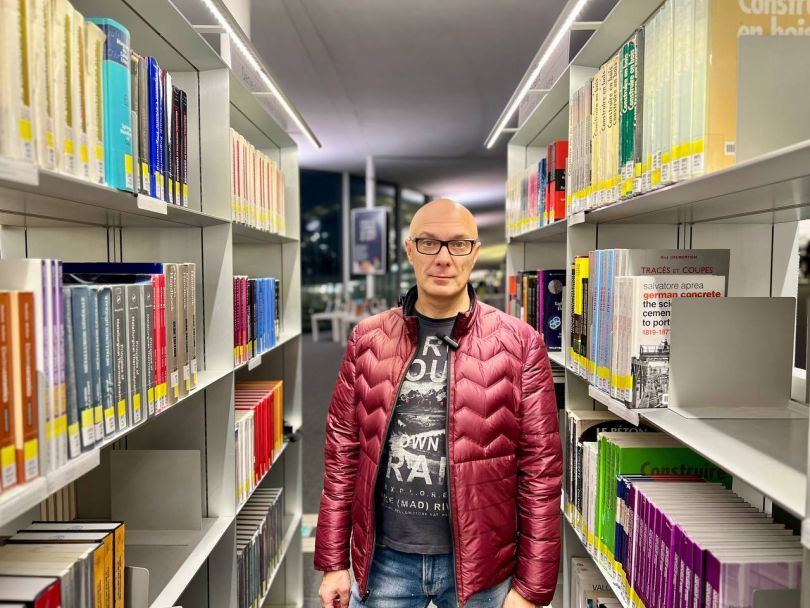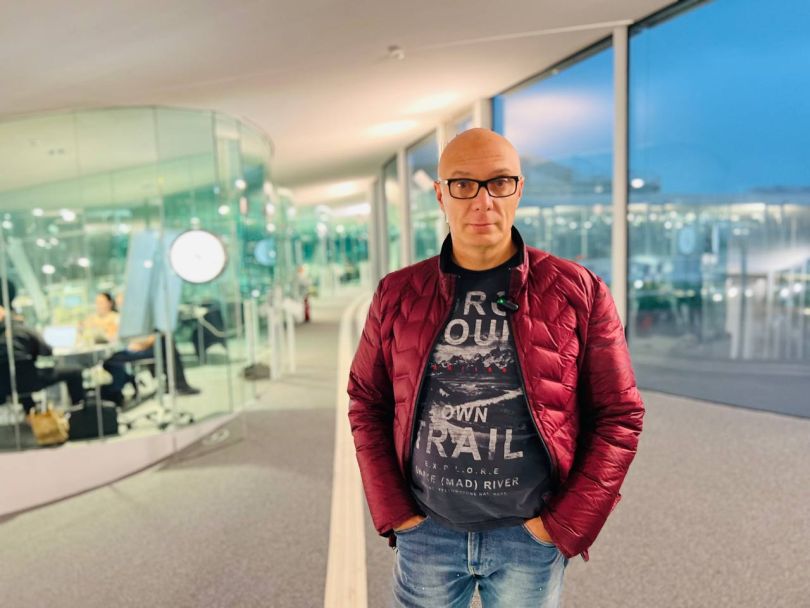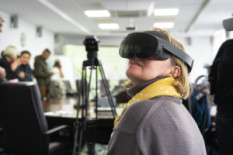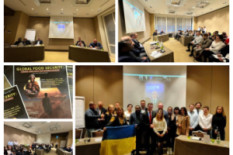On the Destinations.ua platform, we often talk about the integration of Ukrainians into the global community, including the Swiss community. Our task is to connect people and promote quality communication between them. And, of course, a foreign language is the first way to establish it. Therefore, this topic is very relevant to us.
To help Ukrainians learn any foreign language at a high level, we spoke with Ukrainian linguist Serhii Andrusienko, founder of the Neurolinguistic Academy, the developer of a unique neurolinguistic methodology for learning foreign languages that can facilitate the learning process and help you master any foreign language.
Serhii, is it possible to quickly learn to speak a foreign language: French, German, English? How does your methodology contribute to this?
Now, after more than a year and a half of war in Ukraine and living in countries that have provided asylum, many Ukrainians have completed integration courses and even passed A2, B1, or even B2 language exams. However, most people still cannot communicate fluently, especially when it comes to German or French, which have a rather complex grammatical structure that differs from ours. It turns out that the integration courses helped them pass the written exams, but their oral language skills remained unimproved.
My methodology makes it possible to teach oral communication. And from the first lesson, from the first minute of the lesson.
We are forming the structure of the language in our heads, not in a notebook or with the help of a textbook. It is very important that a person master this structure at the level of automatic brain reflexes, without the help of visual materials.
You can enter this methodology without knowing the language at all, that is, practically from scratch, or you can, say, after passing the B2 exam and having difficulty in communicating.

It sounds convincing, but what is the secret of this neurolinguistic technique?
The methodology is based on the latest research in the field of brain neurophysiology.
For example, did you know that a newborn baby has 160 billion free neurons? And they are not connected to each other in any way.
In order for a child to master, for example, speech, he or she begins to connect these neurons. Any skill, including speaking, is a neural connection. And it turns out that by the age of about 16, half of these neurons die. Only 80 billion neurons remain, which are already connected by the skills that the child has mastered by this age, and this is truly a huge amount. Those neurons that were not connected disappear, they no longer exist, and thus the ability to remember is dramatically reduced.
This is also one of the problems with learning a foreign language: we don't have free neurons in adulthood. Memory disappears physiologically.
Studying these patterns of the brain and how it works led me to create a completely new, unique methodology that allows you to quickly master the structure of language at the level of creating new neural connections and restart the speech processor in another language. To do this, you need to increase your understanding of your own grammar, because most of us speak our native languages - Ukrainian and Russian - without analysing the grammar. We never think to say, "I'm going to use the participial phrase now".
When we speak our native language, we don't think about whether we use the future, present or past tense, or analyse which part of speech the word belongs to.
Meanwhile, this is very important for restarting the language processor in another language. Unfortunately, most of the teachers at integration courses are native speakers of the languages you need to learn, and they know neither Ukrainian nor Russian. Every exercise given in our classes is connected with the awareness of how we say it in our native language, with comparing, contrasting and building new neural connections in a foreign language. And that's why my methodology is very effective.
In a nutshell, what is a speech processor?
In short, it is the ability of our brain to turn thoughts into words and phrases. The brain doesn't care what language you use to do this. Therefore, any thought can be translated into any language. It is only important to build the appropriate neural connections for each language. This is what we are doing.
The classical teaching methods available today usually do not take into account the natural limitation imposed by nature: our brain can hold no more than four intellectual objects in our working memory (WM) per unit of time.
The amount of our RAM is highly dependent on our emotional state.
For example, we can't hold 7 digits of a phone number, we have to divide this sequence by 3 + 4. It's the same with words - we can still hold four words in our RAM, but we can't hold more than that. If a person is nervous or not feeling well, this number goes down to three or two objects.
Speech is a process that takes place in the working memory.
We load words and grammatical structure from long-term memory and thus form our thoughts into certain structures. And all of this is "collected" in the RAM. If you don't bring your speech skills to automaticity, you won't be able to start speaking. Speaking is always an improvisation. You don't know what the other person will say to you, what thought will come to your mind at the next moment. Therefore, you need to train your brain to automatically use the speech patterns that make up our language so that you can improvise. My design is structured in such a way that we gradually, step by step, have to master all the speech patterns that are built in such a way that we can make up the correct speech structures, use any grammatical tenses, without resorting to visual aids, because our oral speech and visual perception use different parts of the brain.

Is it so? Isn't a textbook an example of visual information?
Visual memory is more powerful and more ancient, it has existed for millions of years, while the language processor is much younger. According to scientists, it is about 600,000 years old, and it is natural that in order to master a language, you need to work with this part of the brain. When we pick up a textbook or write, we cover a longer distance, and we need to shorten the distance in order to be more effective.
On the other hand a child becomes a native speaker by the age of five. But at the age of five children usually cannot read or write. Nevertheless they can speak correctly, they already have a large vocabulary. If the parents are bilingual, the children can be bilingual - absolutely fluent in two languages. In my practice I have also had children who spoke three languages. When the father is English-speaking, the mother is Ukrainian-speaking, and the grandparents speak, say, Kazakh, the child can easily communicate in three languages with everyone. But at the same time, he cannot read or write. Then he goes to school and, having fully mastered the spoken language, learns the written language of his native country. So why should we learn foreign languages, putting the cart before the horse, starting with reading and writing, with a textbook and a notebook, when we don't know how to speak?
Naturally, this causes difficulties, rejection, blocks in the head...
All this leads to a person having a hard time mastering a foreign language. That's why I have developed a methodology that allows you to abandon the textbook and written assignments, to follow a short, straightforward path to the result, and the result is fluency.
You can learn foreign languages comfortably
It all sounds exciting. But people who integrate into a new community, start their lives over, have to solve a huge number of complex life issues that take a lot of time. How difficult is your methodology to master, how long does it take, are there homework assignments and other stress factors?
When we come to the dentist, we are not surprised to find polite staff, that the doctor is primarily committed to making your visit to the clinic comfortable, to making you want to come there again, that he offers different types of anaesthesia, and in general, as a rule, everything is painless, convenient for the patient, so that we leave satisfied, with renewed teeth. We also come across innovations, new materials, technologies, and fantastic modern equipment every time. The same applies to new gadgets: technology is constantly advancing, new devices appear that make our lives easier.
But for some reason, when we learn foreign languages, we use the old methodology: textbooks, workbooks, homework, we need to cram words using flashcards, etc.
My methodology makes you feel very comfortable, and this is important for learning a language quickly, because if a person feels uncomfortable in class, if it's difficult for him, his working memory, as I said, shrinks from four objects to two, and the efficiency drops four times. So it's very important to feel comfortable like at a dentist’s. In addition at our NeuroLanguage Academy we introduce a complete ban on homework for three months, because people often do not have time for it. Most of them don't have time to do their homework, and then they feel ashamed of it or become very tired doing it. But it doesn't make sense - doing homework doesn't trigger the mechanism of embedding what was learned in class into the brain's neural map.
What is this process, how does it work?
The fact is that our brain is like a two-stroke engine. It can work either in concentration mode or in diffusion mode - embedding and consolidating the information downloaded into the brain. This process is very important for effective learning. And it is carried out by the brain on its own, while we are doing other things - communicating with friends, cooking, walking, doing fitness, etc.
It's similar to the work of parallel processors in an Apple computer, which simultaneously perform several tasks. If you do your homework, i.e. switch back to concentration mode, your brain will not have time to incorporate this information. That's why I believe that doing homework is not only inefficient, it also brings harm and emotional discomfort. With a well-designed methodology, you can completely abandon it.
Our students begin to notice that at the end of the second week this mechanism kicks in, and the brain begins to build phrases on its own, put them together in different combinations, and play with them. And then the very mode of improvisation I was talking about above starts to work.
In addition, we don't use grammatical terms in the classroom. Because they are essentially needed by linguists to communicate with each other. When you speak your native language you don't think about grammar. But when you have a textbook, you need to fill in the pages with something. So they fill it with these terms: Present Perfect Continuous, Past Perfect and Past Participle and Present Participle, etc.
Or, for example, charts that summarise different cases. If you have a specific situation, you don't need to choose, you need to know that you are currently on this particular track.
Visual information lengthens the time it takes to achieve a result, but since everyone has already gone through high school, institutes, and universities, we have formed the attitude that everything should be exactly like this: textbook, workbook, homework. This gives the illusion that you are making progress on the path to language acquisition, but in reality you are stuck in place. Your knowledge and skills remain on paper.
You have no textbook or workbook, you have nowhere to look when you find yourself in a specific speaking situation. You have to speak, and this is a completely different kind of mental activity.
My methodology allows you to master the entire structure of the language in 100 hours of comfortable lessons without homework or cramming. This is equivalent to two volumes of classic grammar textbooks. And this usually takes two years. We can achieve this in 100 hours. Yes, we won't have a huge vocabulary, we'll limit ourselves to the most necessary vocabulary - 2000 words, enough to start communicating, understanding and formulating our thoughts, but at the same time do it freely, using the whole range of grammatical structure, without experiencing any inconvenience or difficulties in using grammar. Only when the grammatical foundation is built, so to speak, when you have walls, ceilings, technical communications, can you start to "decorate" your English, German, French or Spanish house. And the decorating happens very quickly because if you don't have a foundation and a building frame, where do you hang the decorations? If there is no structure, then there is only a big dump from which you need to pull something into light, and this is damn hard.

All this sounds great, but I didn't quite believe that it is possible to understand the language without textbooks. Please make me believe in this.
It sounds fantastic at first glance. I've been teaching languages for 30 years and I started my teaching career by publishing my own grammar book. It was called "English. Formation of Speech Grammar Skills".
The idea was right, but the execution was wrong. It happened in the third year of my teaching experience. I was 25 years old, I was young and “hot”, and I was very proud of this textbook of mine. It was officially adopted by the Ministry of Education. But then I realised that it was not very effective in solving the problem of learning a language quickly. I realised that something was wrong and started reflexing on it.
Then I thought: what about children, they don't have any textbooks, and yet they are learning the language. What about the fact that humanity has been writing for only 3,000 years and speaking for at least 600,000 years?
Imagine - 600,000 years and 3,000 years. That's 20 times less!
So those parts of the brain responsible for reading and writing are much weaker than those parts responsible for speaking. And when there were no textbooks, people still learnt foreign languages and knew how to speak them. How was that? Why don't we take that into account?
If we say that all people have mastered reading and writing, then this did not happen 3000 years ago, but much closer to our time. Who knew how to read and write then? Of course only rich people who could afford to read books. Now we don't really understand how we lived even in the recent past, without books and textbooks.
And in fact grammar emerged only 500 years ago. Before that, there was no grammar. It is a new descriptive field of knowledge. A spoken language is not a programming language: you come up with rules and then start speaking according to them. It was not like that. The language developed on its own, and then linguists came along, founded this science, and began to use certain grammatical terms.
So, of course, learning a foreign language with a textbook is an outdated method. Especially now that we have begun to understand how our brains work.
Well, tell us, how do the classes go?
All classes are held online, which allows you to avoid travelling expenses, use digital technologies, electronic whiteboards, and demonstrations, including pronunciation demonstrations.
The classes themselves are like an exciting fitness class, where you do exercises under the guidance of an experienced teacher-trainer. You don't have textbooks or workbooks. And there is nothing artificial or mechanical, such as exercises to open brackets or fill in the gaps in a sentence with the right words. Instead, you are constantly encouraged to express yourself in a foreign language. And it's very exciting!
In a certain sequence, which I have been working on for many years, you will master the entire structure of the language, and in a very short period of time - just 100 hours. This structure will be built in the form of strong neural connections in your brain, and it is impossible to forget it. And on this basis, you can also quickly expand your vocabulary.

Communication between people is very important nowadays. For each person personally and for the presentation of the country at the level of, so to speak, an individual ambassador.
What do you think can ensure this, perhaps a modern device?
The fact is that communication takes place not only at the level of air vibrations and sound waves, which is what our speech actually is, but also at the emotional level.
For example, you will not be hired with a gadget. Because you can't communicate fully using gadgets. You can use them to translate a text in order to understand and make the text understandable to someone else, but you cannot have a full-fledged communication, because the gadget deprives it of all these factors I mentioned.
So gadgets, new programmes, apps or bots are certainly not bad, and we're glad to have them. But why not use an easy and progressive way of mastering oral language in order to switch on all the mechanisms and open all the doors of communication?
Nowadays, knowledge of the European language strengthens Ukraine's voice in the international arena. For a long time, Ukraine remained, so to speak, Terra Incognita, incomprehensible to the European community. Now we have all the conditions to make Ukraine's voice heard in Europe. And to do this, we need to master at least one European language as soon as possible.
Many Europeans speak several languages quite fluently. Take Switzerland as an example where people speak German, French, Italian, and English absolutely fluently, at the same time speaking their own dialect in a certain canton.
Europeans need to be told about Ukraine's strengths, how it can be useful to the European Union, that it is a very high-tech country, not just an agricultural appendage, that there are many intellectual products, that Ukrainians are civilised and educated, and very knowledgeable in many fields, that we have the highest quality of service in Ukraine, which, by the way, is lacking in Europe, and so on and so forth.
All this cannot be done with gadgets. We need to be able to communicate, we need to have a voice in the EU and thereby show European voters why Europe should help Ukraine, why it is especially important to provide this support now, in this difficult time, and in no way to abandon it, but to strengthen it and integrate Ukraine into the European Union.
Facebook







